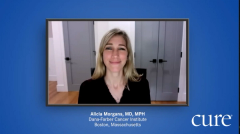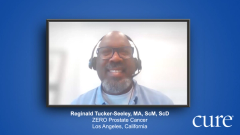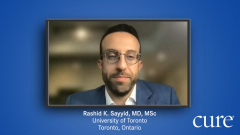
Informing Prostate Cancer Treatment Decisions with Clinical Trials and Real-World Evidence
Expert perspectives on how clinical trials and real-world evidence contribute to treatment decisions in prostate cancer.
Episodes in this series

Transcript:
How do clinical trials and real-world evidence contribute to treatment decisions?
Alicia Morgans, MD, MPH: Clinical trials are essentially ways that we, as physicians and scientists, try to understand which treatment or which approach to therapy or care of an individual is the best. We typically compare maybe 2 different treatment options or sometimes 3 treatment options and put them head-to-head to help us understand what is the best way to move forward for an individual type of patient or an individual patient. I would say that we are very conscious to make sure that all of the options that are compared in clinical trials are equally likely to help the patient. We don’t put patients in situations in clinical trials where they’re not really receiving the best therapy or care that they can get. I usually think of it as a comparison of the standard treatment vs the standard treatment plus something else. We don’t usually remove therapy or remove treatments from these kinds of trials unless our goal is to deintensify or reduce the intensity of the treatment because we think we’re overtreating people. There are trials that are made up that way. And certainly, that would be discussed as people are considering clinical trials and they’re making their choice to get involved.
One other important caveat is that when patients do get involved in clinical trials, evidence suggests that they actually do better on clinical trials in general than they do in standard treatment. Just enrolling in a clinical trial, participating in that process, and getting the extra care from the research team members can help you do better in the long run, which I think is a really wonderful bonus as you’re doing something that’s so altruistic, like participating in a clinical trial.
Another form of research and investigation that we do in medicine, and particularly in cancer care, is to look at groups of patients who are being treated in the real world with the standard therapies that we have using compilations of medical records or perhaps Medicare data or other database data to understand in that real-world setting how people are really doing and how they’re being treated, what complications they’re experiencing, and how well they’re doing on a particular therapy. And those real-world studies can be done without actually even engaging directly with the patient but by using data that’s already contributed through medical records that a patient is providing and the way that they’re actually being cared for in the clinic.
This kind of investigation is not burdensome to patients. It can be really challenging for clinical teams and investigation teams because they have to weed out a lot of noise as they’re trying to understand what’s going on in that kind of a data setup, but it can be a nice way to try to get an understanding of not just how people are doing when they are engaging in those clinical trials and putting in that extra effort and time, but also how they’re doing in clinics like mine, or like the one down the street, or the one in Tennessee where I used to work, or wherever it is throughout the world. People around the world may be treated slightly differently and our real-world cohorts can help us understand what geographic differences exist or what similarities exist, and how we can really raise the level of care for everybody to do our best.
Transcript is AI-generated and edited for clarity and readability.







